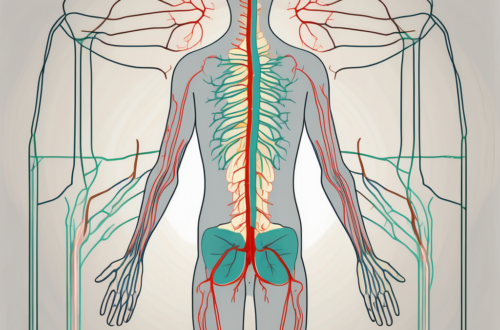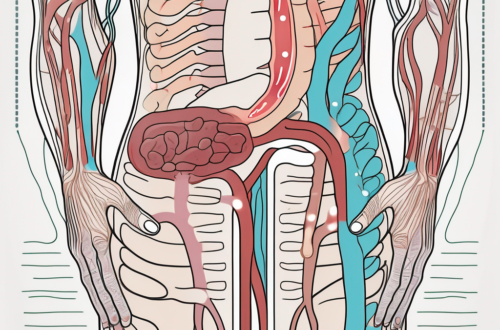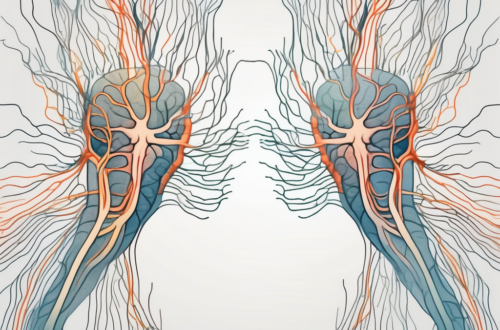The parasympathetic nerve system plays a crucial role in our overall health and well-being. Its function is to regulate the body’s rest and digest response, allowing us to relax, recover, and properly digest food. However, when the parasympathetic nerve system is weak or dysfunctional, it can have a significant impact on our physical and mental health. In this article, we will explore the basics of the parasympathetic nerve system, identify the signs of a weak parasympathetic nerve system, discuss its impact on our health, examine the treatment and management options available, and highlight prevention strategies for maintaining a healthy parasympathetic nerve system.
The Basics of the Parasympathetic Nerve System
The parasympathetic nerve system is one of the two divisions of the autonomic nervous system, along with the sympathetic nerve system. While the sympathetic nerve system triggers the fight-or-flight response, the parasympathetic nerve system counterbalances this response by promoting relaxation and restoration.
This division of the nervous system consists of a network of nerves that originates in the brain and extends throughout the body. These nerves release neurotransmitters, such as acetylcholine, which transmit signals between various organs and tissues, allowing them to function optimally.
When we think about the parasympathetic nerve system, it’s important to understand its crucial role in maintaining our overall well-being. Let’s explore further.
The Role and Function of the Parasympathetic Nerve System
The primary role of the parasympathetic nerve system is to maintain homeostasis by conserving energy and promoting restorative processes. It does this by activating various bodily functions that help us relax and recover from the stressors of daily life.
One of the key functions of the parasympathetic nerve system is its ability to slow down the heart rate. When activated, it sends signals to the heart, instructing it to beat at a more relaxed pace. This decrease in heart rate not only conserves energy but also allows the body to focus on other essential tasks, such as digestion and nutrient absorption.
Speaking of digestion, the parasympathetic nerve system plays a vital role in enhancing this process. It stimulates the release of digestive enzymes, promotes smooth muscle contractions in the gastrointestinal tract, and increases blood flow to the digestive organs. All of these actions work together to optimize nutrient absorption and ensure that our bodies receive the necessary fuel for optimal functioning.
In addition to its impact on the cardiovascular and digestive systems, the parasympathetic nerve system also has a profound effect on our mental well-being. When activated, it promotes relaxation and reduces stress levels. This is achieved through the release of neurotransmitters that help calm the mind and induce a sense of calm and well-being.
Overall, the parasympathetic nerve system acts as a guardian of our body’s balance. It ensures that our physiological processes are in harmony, allowing us to function optimally and maintain a state of equilibrium.
The Anatomy of the Parasympathetic Nerve System
The parasympathetic nerve system consists of two main components: the cranial nerve system and the sacral nerve system. These components work together to regulate bodily functions and ensure the body’s ability to rest and repair itself.
The cranial nerve system arises from the brainstem and includes nerves such as the vagus nerve. The vagus nerve is a major player in the parasympathetic nerve system, as it innervates various organs in the thoracic and abdominal cavities. It carries signals that slow down heart rate, stimulate digestion, and promote relaxation.
On the other hand, the sacral nerve system originates from the sacral region of the spinal cord. It plays a crucial role in innervating the reproductive organs, urinary bladder, and rectum. By activating these areas, the sacral nerve system ensures proper functioning and maintenance of these vital systems.
Together, the cranial and sacral components of the parasympathetic nerve system work in harmony to regulate bodily functions. They form a complex network of communication pathways that allow for precise control and coordination of various physiological processes.
Understanding the anatomy of the parasympathetic nerve system provides us with a deeper appreciation for its intricate workings and its ability to maintain our overall health and well-being.
In conclusion, the parasympathetic nerve system is a remarkable division of the autonomic nervous system. Its role in promoting relaxation, restoring balance, and ensuring optimal bodily functions cannot be overstated. By understanding its basics, we gain insight into the intricate mechanisms that allow our bodies to thrive.
Identifying a Weak Parasympathetic Nerve System
An impaired or weak parasympathetic nerve system can manifest itself through various signs and symptoms. However, it is essential to note that these symptoms can also be indicative of other medical conditions. Consulting with a healthcare professional is always recommended to obtain an accurate diagnosis. Some common symptoms and signs associated with a weak parasympathetic nerve system include:
Common Symptoms and Signs
- Frequent fatigue and low energy levels
- Difficulty sleeping or disrupted sleep patterns
- Poor digestion and gastrointestinal issues
- Reduced heart rate variability
- Increased susceptibility to stress and anxiety
If you experience any of these symptoms persistently, it’s advisable to seek medical guidance to determine the underlying cause and develop an appropriate treatment plan.
Diagnostic Methods and Procedures
When diagnosing a weak parasympathetic nerve system, healthcare professionals may employ various diagnostic methods and procedures, such as:
- Medical history assessment
- Physical examination
- Electrocardiogram (ECG) to measure heart rate variability
- Autonomic function tests
These diagnostic tools help healthcare professionals gather comprehensive information about your condition and develop an informed treatment approach tailored to your specific needs.
Understanding the signs and symptoms of a weak parasympathetic nerve system is crucial for identifying and addressing potential health concerns. Fatigue and low energy levels are commonly experienced by individuals with a weakened parasympathetic nerve system. This can make it challenging to perform daily activities and may lead to a decreased quality of life.
Sleep disturbances are another common symptom associated with a weak parasympathetic nerve system. Individuals may find it difficult to fall asleep or experience disrupted sleep patterns, leading to feelings of restlessness and daytime fatigue. Poor digestion and gastrointestinal issues, such as bloating, constipation, or diarrhea, can also be indicators of an impaired parasympathetic nerve system.
Reduced heart rate variability is a physiological marker often observed in individuals with a weak parasympathetic nerve system. Heart rate variability refers to the variation in time intervals between consecutive heartbeats. A decrease in heart rate variability may indicate an imbalance in the autonomic nervous system, specifically the parasympathetic branch.
Increased susceptibility to stress and anxiety is another symptom commonly associated with a weak parasympathetic nerve system. The parasympathetic nervous system plays a crucial role in regulating the body’s stress response and promoting relaxation. When this system is weakened, individuals may experience heightened stress levels and difficulty managing anxiety.
While these symptoms can be indicative of a weak parasympathetic nerve system, it is important to consult with a healthcare professional for an accurate diagnosis. Medical history assessments, physical examinations, and diagnostic tests such as electrocardiograms and autonomic function tests are commonly used to evaluate the functioning of the parasympathetic nervous system.
By gathering comprehensive information about an individual’s medical history and conducting physical examinations, healthcare professionals can gain valuable insights into the potential underlying causes of a weak parasympathetic nerve system. Electrocardiograms are used to measure heart rate variability, providing objective data to assess the functioning of the parasympathetic branch of the autonomic nervous system.
Autonomic function tests, which may include measures of heart rate response to deep breathing or changes in blood pressure, can further evaluate the integrity of the parasympathetic nervous system. These tests help healthcare professionals develop an informed treatment approach tailored to the individual’s specific needs, aiming to restore balance and enhance overall well-being.
The Impact of a Weak Parasympathetic Nerve System
A weak parasympathetic nerve system can have a profound impact on both our physical and mental well-being. Let’s explore the effects in more detail:
Effects on Physical Health
A dysfunctional parasympathetic nerve system can disrupt various bodily functions, leading to physical health issues. For instance, impaired digestion and nutrient absorption can result in gastrointestinal disorders, nutrient deficiencies, and compromised immune function. This can manifest as symptoms such as bloating, constipation, or diarrhea, and a weakened ability to fight off infections.
Additionally, a weakened parasympathetic nerve system may contribute to cardiovascular problems, as it is involved in regulating heart rate and blood pressure. When this system is compromised, individuals may experience irregular heart rhythms, high blood pressure, or poor blood circulation. These conditions can increase the risk of heart disease, stroke, and other cardiovascular complications.
Furthermore, a compromised parasympathetic nerve system can impair the body’s ability to rest and repair itself, leading to chronic fatigue, reduced sleep quality, and increased vulnerability to infections or illnesses. This can result in a constant feeling of tiredness, difficulty concentrating, and a weakened immune response.
Given the potential impact on physical health, it is essential to address and manage a weak parasympathetic nerve system effectively. This can involve lifestyle changes, such as adopting a balanced diet, engaging in regular exercise, practicing stress management techniques, and seeking appropriate medical care.
Effects on Mental Health
Our mental health is closely intertwined with the functioning of the parasympathetic nerve system. When this system is weakened, it can contribute to a range of mental health concerns, including heightened levels of stress, anxiety, and reduced emotional resilience.
Individuals with a weak parasympathetic nerve system may experience difficulty relaxing, frequent feelings of restlessness, and an increased tendency to worry or ruminate. This can lead to chronic stress, which has been linked to various mental health disorders such as generalized anxiety disorder, panic disorder, and depression.
Moreover, a compromised parasympathetic nerve system can disrupt the balance of neurotransmitters in the brain, such as serotonin and dopamine, which are essential for regulating mood and emotions. This imbalance can contribute to mood swings, irritability, and a decreased ability to cope with daily stressors.
Furthermore, a weakened parasympathetic nerve system can affect sleep patterns, leading to difficulties falling asleep or staying asleep throughout the night. This can result in chronic insomnia, which further exacerbates mental health issues and impairs overall cognitive function.
Addressing the impact of a weak parasympathetic nerve system on mental health requires a comprehensive approach. This may include therapy, relaxation techniques, mindfulness practices, and medication if necessary. It is crucial to seek professional help to develop an individualized treatment plan.
Treatment and Management of a Weak Parasympathetic Nerve System
While there is no direct treatment to strengthen the parasympathetic nerve system, managing the underlying causes and supporting its function can alleviate symptoms and improve overall well-being. The parasympathetic nerve system plays a crucial role in regulating various bodily functions, including digestion, heart rate, and relaxation response. When this system is weakened, it can lead to a range of symptoms, such as digestive issues, sleep disturbances, and increased stress levels.
Medical Interventions and Therapies
Healthcare professionals may recommend various interventions and therapies to address the underlying causes and manage symptoms of a weak parasympathetic nerve system. These may include medications to alleviate specific symptoms, such as sleep aids for insomnia or medications to regulate heart rate and blood pressure. Additionally, certain medical procedures, such as nerve stimulation techniques or targeted injections, may be utilized to enhance the function of the parasympathetic nerve system.
Physical therapies, such as acupuncture and massage, may also be prescribed to support relaxation and stress reduction. Acupuncture, an ancient Chinese practice, involves the insertion of thin needles into specific points on the body to stimulate the parasympathetic nerve system and promote overall balance. Similarly, massage therapy can help relax the body and mind, activating the parasympathetic response and reducing stress levels.
Lifestyle Changes and Home Remedies
Adopting healthy lifestyle habits can significantly support the functioning of the parasympathetic nerve system. Engaging in regular physical exercise, such as yoga or tai chi, can promote relaxation and stimulate the parasympathetic nerve system. These practices incorporate gentle movements, deep breathing, and mindfulness, all of which activate the parasympathetic response and help restore balance in the body.
In addition to exercise, following a balanced diet rich in fruits, vegetables, and whole grains can ensure optimal nutrient intake to support the parasympathetic nerve system. Certain foods, such as chamomile tea, which has calming properties, and foods high in omega-3 fatty acids, like salmon and walnuts, can also provide additional support to the parasympathetic nerve system.
Practicing stress management techniques is another crucial aspect of managing a weak parasympathetic nerve system. Meditation, deep breathing exercises, and mindfulness can help reduce stress levels and activate the relaxation response. These practices promote a sense of calm and well-being, allowing the parasympathetic nerve system to function optimally.
It is important to note that lifestyle changes and home remedies should always be combined with appropriate medical guidance. Consulting with a healthcare professional can provide personalized recommendations and ensure the most effective treatment and management plan for a weak parasympathetic nerve system.
By implementing these strategies and seeking appropriate medical support, individuals can enhance the function of the parasympathetic nerve system, improving overall health and well-being.
Prevention Strategies for a Healthy Parasympathetic Nerve System
Maintaining a healthy parasympathetic nerve system is crucial for overall health and wellness. While some factors affecting its function may be beyond our control, there are still preventive measures we can take to support its strength:
Importance of Regular Exercise
Engaging in regular physical exercise not only promotes overall health but also supports the optimal functioning of the parasympathetic nerve system. Activities such as walking, jogging, swimming, or cycling can help reduce stress levels, improve cardiovascular health, and enhance overall well-being.
Balanced Diet and Proper Nutrition
A well-balanced diet that includes essential nutrients, vitamins, and minerals is vital for nourishing the body and supporting the parasympathetic nerve system. Incorporate a variety of fruits, vegetables, whole grains, lean proteins, and healthy fats into your diet to maintain optimal nutrition.
Stress Management Techniques
Chronic stress can negatively affect the parasympathetic nerve system. Therefore, implementing stress management techniques is crucial for maintaining a healthy balance. Practices such as meditation, deep breathing exercises, and mindfulness can help calm the mind, reduce stress, and promote overall relaxation.
Future Research Directions in Parasympathetic Nerve System Health
Ongoing research continues to deepen our understanding of the parasympathetic nerve system and its impact on our health. As science progresses, emerging treatments and therapies may offer new possibilities for managing a weak parasympathetic nerve system.
Emerging Treatments and Therapies
Medical advancements may bring forth new treatments and therapies to address the underlying causes of a weak parasympathetic nerve system more effectively. These may include novel medications, alternative therapies, or innovative technological interventions.
The Role of Genetics in Parasympathetic Nerve System Strength
Research focusing on the genetic factors influencing parasympathetic nerve system strength is another area of interest. Understanding these genetic markers could potentially lead to personalized treatments and preventive strategies in the future, based on an individual’s unique genetic makeup.
In conclusion, recognizing and understanding the impact of a weak parasympathetic nerve system is crucial for maintaining optimal health. While medical interventions and therapies can help manage symptoms, adopting a holistic approach that includes lifestyle changes, preventive measures, and consultation with healthcare professionals can support the overall function and well-being of the parasympathetic nerve system. By prioritizing the health of this vital system, we can enhance our physical and mental wellness, leading to a more balanced and fulfilling life.





